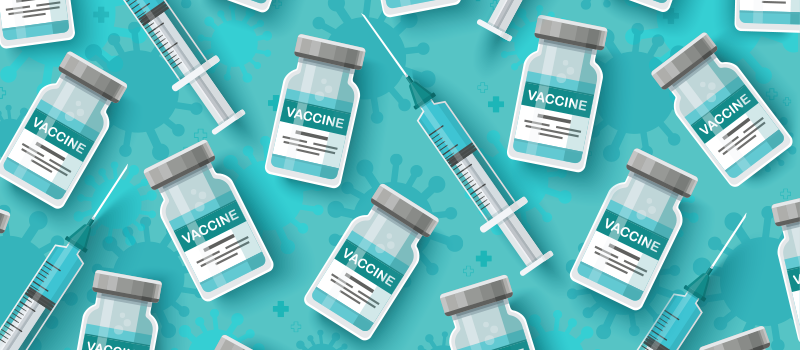What’s the Buzz
The Bee Healthy Blog
What People with Allergies Need to Know About the COVID-19 Vaccines

Over 500,000 Americans have died in 2020-2021 due to COVID-19 complications, and it’s been reported that over 2.6 million have died worldwide[1]. The vaccines we’ve been waiting for are finally here, and have been shown to be highly effective at preventing COVID-19—but are they safe for people who suffer from allergies? Here’s everything that is known so far about the COVID-19 vaccines and allergies.
Allergies and COVID-19 Vaccines
Although none of the vaccines are FDA approved, to protect public health, the FDA has approved them for Emergency Use Authorization (EUA)—a mechanism to facilitate the availability and use of medical countermeasures, including vaccines, during public health emergencies, such as the current COVID-19 pandemic[2]. According to the Centers for Disease Control and Prevention (CDC), millions of people in the United States have received COVID-19 vaccines, and these vaccines have undergone the most intensive safety monitoring in U.S. history. However, it is noted that if you are allergic to any of the ingredients in any of the available vaccines, you should NOT get the vaccine[3].
What is Considered a Severe Allergic Reaction?
Nearly one in fifty Americans are at risk for anaphylaxis—a severe allergic reaction[4] in which a person needs to be treated with epinephrine or EpiPen® or go to the hospital[2].
Anaphylaxis must be treated right away to allow the best chance for improvement and prevent serious, potentially life-threatening complications. Symptoms of anaphylaxis usually involve more than one part of the body such as the skin, mouth, eyes, lungs, heart, gut, and brain. Some symptoms include[4]:
- Skin rashes and itching and hives
- Swelling of the lips, tongue, or throat
- Shortness of breath, trouble breathing, wheezing
- Dizziness and/or fainting
- Stomach pain, vomiting, or diarrhea
If you are allergic or have a history of being allergic to any of the present ingredients below, you should NOT get the vaccine.
Pfizer BionTech COVID-19 Vaccine
Pfizer’s vaccine is administered in two doses, 3 weeks apart, into the muscle. Inactive ingredients in the Pfizer BioNTech COVID-19 vaccine include[2]:
- Potassium chloride
- Monobasic potassium
- Phosphate
- Sodium chloride
- Dibasic
Johnson & Johnson’s/Janssen COVID-19 Vaccine
This is a single-dose vaccine injected into the muscle. According to the FDA, the Janssen vaccine includes the following ingredients[2]:
- Recombinant
- Replication-incompetent adenovirus type 26 expressing the SARS-CoV-2 spike protein
- Citric acid monohydrate
- Trisodium citrate dihydrate
- Ethanol
- 2-hydroxypropyl-β-cyclodextrin (HBCD)
- Polysorbate-80
- Sodium chloride
Moderna COVID-19 Vaccine
Moderna’s vaccine is similar to Pfizer BioNTech’s and also has no live virus in it. The vaccine is administered in two doses, one month apart, into the muscle. Its ingredients include[2]:
- Messenger ribonucleic acid (mRNA)
- Lipids, or fatty substances, including: SM (sphyngomyelin-102), polyethylene glycol [PEG] 2000 dimyristoyl glycerol [DMG], 1,2-distearoyl-sn-glycero-3-phosphocholine [DSPC], and cholesterol
- Tromethamine
- Tromethamine hydrochloride
- Acetic acid
- Sodium acetate
- Sucrose
Common Side Effects of the COVID-19 Vaccines
Side effects after your second shot may be more intense than the ones you experienced after your first shot. These side effects are normal signs that your body is building immunity and should go away within a few days. Common side effects include[2]:
- Pain, redness, and swelling on injection site
- Tiredness
- Headache
- Muscle pain
- Chills
- Fever
- Nausea
Immediate and more severe allergic reactions happen within 4 hours after getting vaccinated and could include symptoms such as hives, swelling, and wheezing (respiratory distress). For this reason, your vaccination provider may ask you to stay at the place where you received your vaccine for monitoring after vaccination.
If you get a rash where you got the shot
CDC has learned of reports that some people have experienced a red, itchy, swollen, or painful rash where they got the shot. These rashes can start a few days to more than a week after the first shot and are sometimes quite large. These rashes are also known as “COVID arm.” If you experience “COVID arm” after getting the first shot, you should still get the second shot at the recommended interval if the vaccine you got needs a second shot. Tell your vaccination provider that you experienced a rash or “COVID arm” after the first shot. Your vaccination provider may recommend that you get the second shot in the opposite arm. If the rash is itchy, you can take an antihistamine. If it is painful, you can take pain medication like acetaminophen or a non-steroidal anti-inflammatory drug (NSAID)[2].
If you have a non-severe allergic reaction to a COVID-19 vaccine
It’s recommended that if you’ve had any type of allergic reaction to any of the ingredients in the vaccine, you should not get it. If you had an allergic reaction to the first dose of a COVID-19 vaccine, the CDC doesn’t recommend getting the second dose. But overall, having allergies doesn’t exclude you from getting the vaccine[2]. There is not enough scientific information at this time to know whether having seasonal allergies puts you at higher risk of contracting COVID-19 or having more severe symptoms if you do contract COVID-19.
If you get a COVID-19 vaccine and you think you might be having a severe allergic reaction after leaving the vaccination provider site, seek immediate medical care by calling 911.
Stay up to date with COVID-19 coverage and COVID-19 vaccine updates from the CDC.
[1] https://ourworldindata.org/covid-deaths
[2] https://www.cdc.gov/coronavirus/2019-ncov/vaccines/safety/allergic-reaction.html
[3] https://health.clevelandclinic.org/should-you-get-the-covid-19-vaccine-if-you-have-allergies/#:~:text=It's%20recommended%20that%20if%20you,you%20from%20getting%20the%20vaccine.
[4] https://www.kidswithfoodallergies.org/what-is-anaphylaxis.aspx?gclid=Cj0KCQjw0caCBhCIARIsAGAfuMzNt7WeWJncUwAW83uHNJL_6S35x8A3uMGX2wP171R8j3m0qD-OeXkaApt8EALw_wcB

SOCIAL